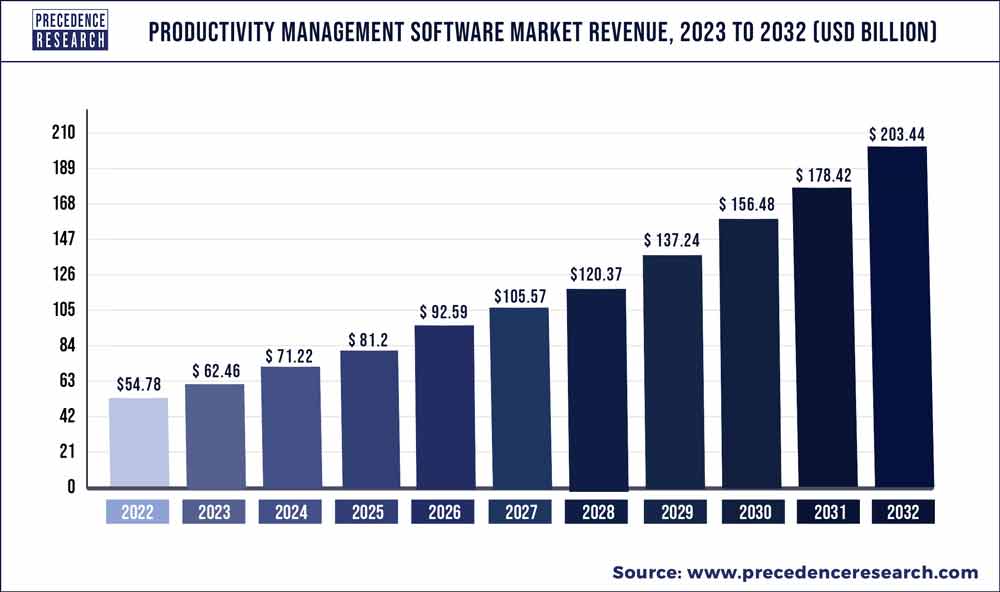The global productivity management software market size accounted for US$ 54.78 Bn in 2022 and is projected to reach around USD 203.44 Bn by 2032, growing at a CAGR of 14.02% from 2023 to 2032.
Report Summary
The global productivity management software market report provides a Point-by-Point and In-Depth analysis of global market size, regional and country-level market size, market share, segmentation market growth, competitive landscape, sales analysis, opportunities analysis, strategic market growth analysis, the impact of domestic and global market key players, value chain optimization, trade regulations, recent developments, product launches, area marketplace expanding, and technological innovations.
The study offers a comprehensive analysis on diverse features, including production capacities, demand, product developments, revenue generation, and sales in the productivity management software market across the globe.
A comprehensive estimate on the productivity management software market has been provided through an optimistic scenario as well as a conservative scenario, taking into account the sales of productivity management software during the forecast period. Price point comparison by region with global average price is also considered in the study.
Download Access to a Free Copy of Our Latest Sample Report@ https://www.precedenceresearch.com/sample/2826
Productivity Management Software Market Report Scope
| Report Coverage | Details |
| Market Size in 2023 | USD 62.46 Billion |
| Market Size by 2032 | USD 203.44 Billion |
| Growth Rate from 2023 to 2032 | CAGR of 14.02% |
| Largest Market | North America |
| Base Year | 2022 |
| Forecast Period | 2023 to 2032 |
| Segments Covered | By Solution, By Deployment, and By Enterprise Size |
| Regions Covered | North America, Europe, Asia-Pacific, Latin America and Middle East & Africa |
Key Highlights:
Reports Coverage: It incorporates key market sections, key makers secured, the extent of items offered in the years considered, worldwide containerized productivity management software market and study goals. Moreover, it contacts the division study gave in the report based on the sort of item and applications.
Market Outline: This area stresses the key investigations, market development rate, serious scene, market drivers, patterns, and issues notwithstanding the naturally visible pointers.
Market Production by Region: The report conveys information identified with import and fare, income, creation, and key players of every single local market contemplated are canvassed right now.
Also Read: Single-use Consumables Market Size To Cross USD 13.28 Bn By 2032
Productivity Management Software Market Players
The report includes the profiles of key productivity management software market companies along with their SWOT analysis and market strategies. In addition, the report focuses on leading industry players with information such as company profiles, components and services offered, financial information, key development in past five years.
Major companies operating in this area
- Salesforce
- Oracle
- Microsoft
- Adobe
- Asana
- Trello
- Basecamp
- Toggl
- Harvest
- Evernote
- IBM
- OneNote
- Slack
- Microsoft Teams
- Monday.com
- Podio
- ClickUp
- Wrike
- Zoho Projects
- Smartshee
Market Segmentation
By Solution
- Content Management & Collaboration
- AI & Predictive Analytics
- Structured Work Management
- Other Solutions
By Deployment
- On-Premise
- Cloud
By Enterprise Size
- Large Enterprises
- Small & Mid-Size Enterprises
Regional Segmentation
- North America (U.S., Canada, Mexico)
- Europe (Germany, France, U.K., Italy, Spain, Rest of Europe)
- Asia-Pacific (China, Japan, India, Southeast Asia and Rest of APAC)
- Latin America (Brazil and Rest of Latin America)
- Middle East and Africa (GCC, North Africa, South Africa, Rest of MEA)
Research Methodology
Secondary Research
It involves company databases such as Hoover’s: This assists us to recognize financial information, the structure of the market participants and industry’s competitive landscape.
The secondary research sources referred in the process are as follows:
- Governmental bodies, and organizations creating economic policies
- National and international social welfare institutions
- Company websites, financial reports and SEC filings, broker and investor reports
- Related patent and regulatory databases
- Statistical databases and market reports
- Corporate Presentations, news, press release, and specification sheet of Manufacturers
Primary Research
Primary research includes face-to-face interviews, online surveys, and telephonic interviews.
- Means of primary research: Email interactions, telephonic discussions and Questionnaire-based research etc.
- In order to validate our research findings and analysis, we conduct primary interviews of key industry participants. Insights from primary respondents help in validating the secondary research findings. It also develops Research Team’s expertise and market understanding.
Thanks for reading you can also get individual chapter-wise sections or region-wise report versions such as North America, Europe, or the Asia Pacific.
Contact Us:
Mr. Alex
Sales Manager
Call: +1 9197 992 333
Email: sales@precedenceresearch.com

